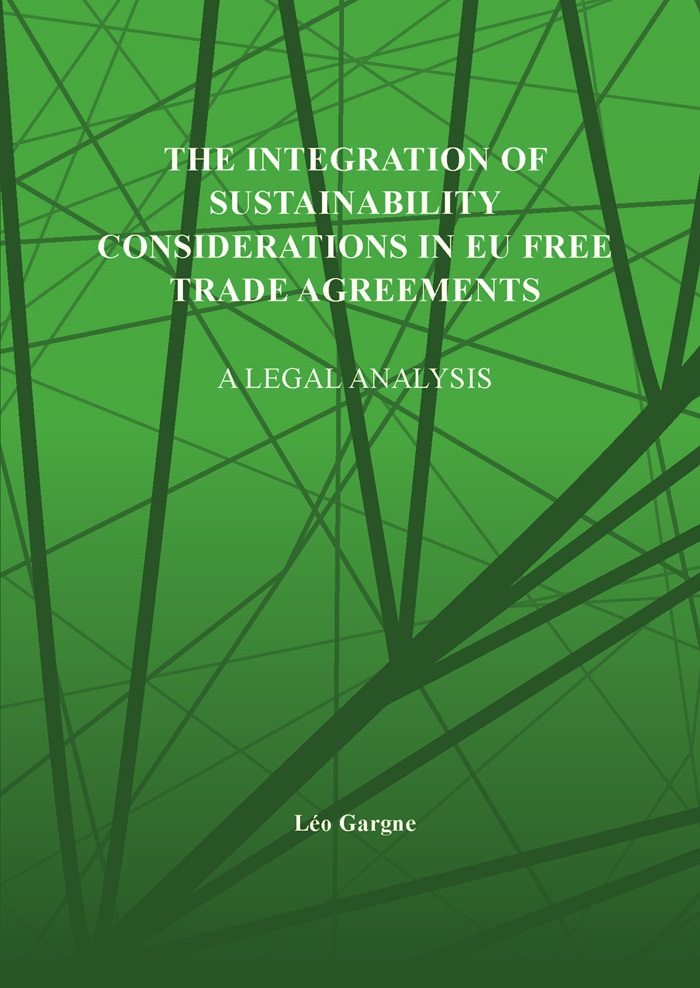
Léo Gargne’s dissertation examines the manner in which the EU takes into account considerations relating to sustainable development in the conduct of its international trade policy. Specifically, his research explores the systematic integration of sustainability provisions in the Free Trade Agreements (FTAs) that the EU negotiates and concludes with third countries. These provisions, which deal with the protection of the environnement and labour rights, are incorporated into a specific chapter of the trade agreements in question, namely the Trade and Sustainable Development (TSD) chapter.
Against this background, the first part of the dissertation is dedicated to issues of EU external relations law. The objective of the research at this stage is to determine the leeway afforded to EU institutions – prime among which the European Commission – when concluding deep and comprehensive international trade agreements, which increasingly feature trade-plus issues. To that end, relevant rules of EU primary law are looked at to establish which competences have been conferred upon the EU and determine with more precision the specific situations in which the EU has the authority to conclude FTAs on its own without the participation of its Member States.
The second part of the dissertation then zooms in on the specific legal provisions included in TSD chapters, i.e., TSD provisions. The aim of this textual analysis is to ascertain whether TSD provisions are couched in binding language and whether they are specific enough to bind the parties in a meaningful way. The enforcement mechanisms available to the parties under their trade agreement is also looked at in an effort to find out if these provisions are truly enforceable. In that context, the utilisation of sanctions as a compliance-inducing tool is explored. Importantly, in June 2022, the Commission operated a partial reversal of its long-held view that enforcement should be solely ensured via collaboration and dialogue and introduced the possibility to impose sanctions in limited circumstances and with regard to core TSD commitments. The legal implications of this shift are investigated.
Finally, the third part of the dissertation takes a sidestep into a different field, that of human rights, in order to focus on essential elements clauses which have been included in EU international agreements since the mid-1990s and have traditionally conditioned the granting of development or cooperation aid upon the respect of certain human rights norms deemed to constitute ‘essential elements’ of the agreements in question. The Commission has recently proposed to adopt a similar approach in the field of sustainable development by characterizing certain core TSD commitments as ‘essential elements’ of its international trade agreements. Thus, by analysing the roots of this model, this dissertation endeavours to assess whether extending this conditionality system to the trade concessions granted under EU FTAs can really reinforce the enforcement arsenal at the parties’ disposal in cases of non-compliance with sustainability commitments. Several recommendations are formulated so as to make the adoption of such a system as optimal and effective as possible.
Ultimately, Léo Gargne’s dissertation aims to reflect more generally on the governance of economic activity in a sustainable manner and on global institutional processes entrusted with the task of enforcing global norms and contributing to public policy objectives.
Gargné defended his thesis June 4th at Tilburg Law School. Promotors: prof. Panagiotis Delimatsis and prof. Leonie Reins.
Léo Gargne
The integration of sustainability considerations in EU free trade agreements: A legal analysis
Layout and print: proefschrift-aio.nl
ISBN 978 94 9340 654 4
De dissertatie is verkrijgbaar in open access

